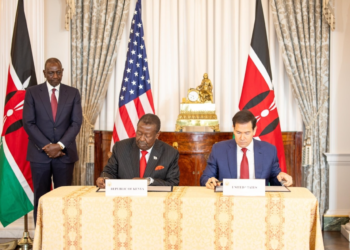Kenya has initiated bilateral talks with Qatar to finalise a new labour agreement that could see the number of Kenyan workers in the Gulf state surge from 67,000 to over 200,000, according to Kenya’s Cabinet Secretary for Labour and Social Protection, Alfred Mutua.
The discussions, held at the Kenyatta International Convention Centre (KICC) in Nairobi, aim to amend the 2012 Bilateral Labour Agreement, shifting focus from unskilled to skilled labour migration. Dr Mutua, who led the Kenyan delegation in talks with Qatar’s Minister of Labour, Saeed Samikh Al-Marri, described the potential agreement as a “significant step toward expanding our labour export market.”
The proposed Memorandum of Understanding (MoU) comes as Qatar continues its ambitious development projects, creating a growing demand for skilled workers across various sectors. “This MoU will open thousands of opportunities for skilled Kenyans to contribute to Qatar’s growth while gaining valuable experience and bettering their livelihoods,” Dr Mutua stated.
Key sectors targeted for Kenyan professionals include ICT, health, education, infrastructure, and agriculture. The agreement aims to address Qatar’s labour needs while ensuring fair treatment and protection for Kenyan workers.
Dr Mutua emphasised the ethical dimension of the partnership, stating, “The talks reaffirm Kenya’s commitment to providing ethical, trained, and well-prepared workers to meet Qatar’s needs, while ensuring that our workers are protected and treated fairly.”
The Kenyan delegation included Principal Secretaries Shadrack Mwadime (Labour) and Joseph Motari (Social Protection), along with officials from the National Employment Authority (NEA) and the National Industrial Training Authority (NITA).
A notable outcome of the discussions is the agreement to establish a Qatar Visa Centre in Nairobi. This centre aims to streamline the migration process by ensuring proper contract signing and completion of necessary documentation before workers depart for Qatar.
The potential increase in Kenyan workers in Qatar represents a significant boost to Kenya’s labour export strategy. Dr Mutua expressed optimism about the impact, saying, “With this new agreement, we anticipate that number to rise significantly—possibly reaching over 200,000—unlocking a wave of employment opportunities for Kenyan professionals in Qatar’s key development sectors.”
The move comes as Gulf states continue to be attractive destinations for African workers seeking improved economic opportunities. However, concerns about worker rights and conditions in the region have persisted, making the emphasis on protection in this new agreement particularly noteworthy.
Dr Mutua assured that the Kenyan government is “committed to ensuring that the rights of Kenyan workers are upheld and that the labour migration process remains transparent, fair, and beneficial to all involved.”


















